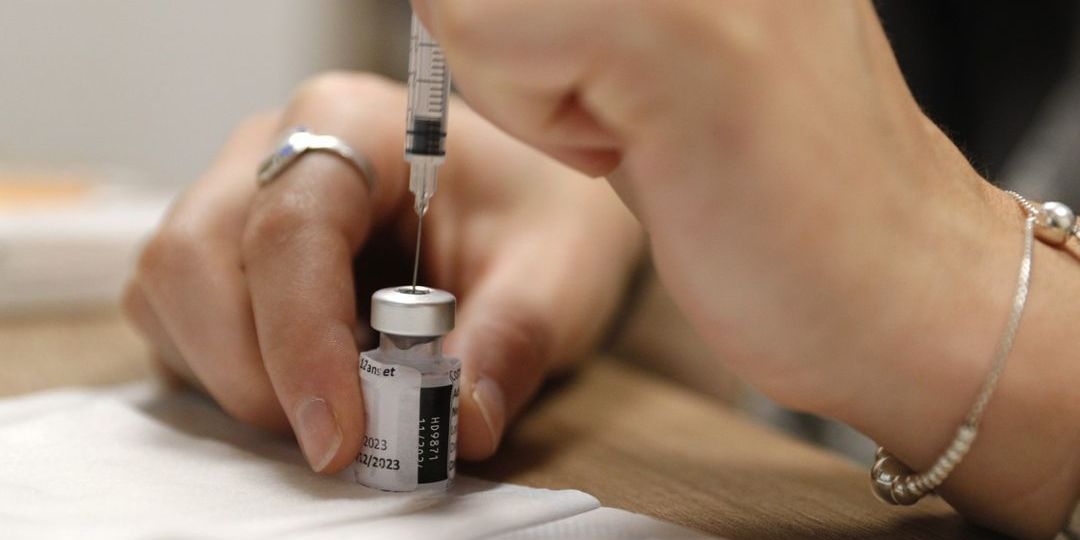
The February 2024 publication of the largest peer-reviewed study of Covid-19 vaccine safety to date has inspired misleading social media claims that its findings show the jabs are unsafe. Study authors and independent experts say the research confirms that adverse reactions to vaccination are rare and pose far fewer risks than Covid-19 infection.
“Scientists found MASSIVE increased risks of developing several serious health conditions post-jab,” claims a February 23, 2024 Facebook post with a video of Del Bigtree, head of one of the best-funded anti-vaccine organizations in the United States.
In the clip, he discusses the results of a study published February 12, 2024 in the journal Vaccine that assessed Covid-19 vaccine safety across eight countries (archived here).
A woman in another video posted to Instagram claims: “They found that there has been an increase in heart issues, cognitive issues and other side effects. Although the study deemed this a small percentage of people, it doesn’t matter how small it is.”


French-language posts on X, formerly Twitter, allege the study found the vaccines are causing “serious health problems,” with some users sharing screenshots of an article from le Journal de Montréal (archived here).
The claims are the latest wave of misinformation about Covid-19 vaccines, which researchers estimate have saved millions of lives.
Epidemiologist Anders Peter Hviid, one of the study authors, told AFP the findings confirm previous research and should not deter people from receiving Covid-19 shots.
“What we take away is that the Covid-19 vaccination campaigns have been very effective in preventing severe disease,” he said on February 23. “The few serious side effects that we have observed in this and other studies have been rare.”
Heart risks
The Global Vaccine Data Network conducted the study misrepresented online, which included records from more than 99 million people vaccinated in Australia, Canada, France, Denmark, Scotland, Argentina, Finland and New Zealand.
Researchers compared the rate of 13 adverse events following Covid-19 vaccination to that of the same conditions between 2015 and 2019, before the pandemic. The authors identified each adverse event for which the occurrence was greater than 1.5 times the expected rate — what researchers calculate to be observed by chance following vaccination — as a “safety signal,” while noting that this does not signify a “causal relationship.”
This was the case for myocarditis, inflammation of the heart muscle, and pericarditis, inflammation of the membrane surrounding the heart.
Data from both France and Canada had already found an increased risk of heart-related complications, particularly for younger men who received messenger ribonucleic acid (mRNA) shots (archived here and here). But Hviid said those associations “are rare and have good prognoses.”
Study author Jeff Kwong agreed, saying the paper’s findings do not give him pause about recommending vaccination.
“If anything, this study reinforces that Covid vaccines are very safe,” he told AFP on February 27.
Kwong, associate director of the Centre for Vaccine-Preventable Diseases at the University of Toronto, said the research confirmed national monitoring systems’ ability to detect rare adverse outcomes — and that more common risks would have already been identified.
He said patients must also consider the bigger risks associated with Covid-19 infection.
An August 2022 meta-analysis of 22 papers (archived here) found a seven-fold higher risk of myocarditis in those infected with Covid-19 than in those who received the vaccine.
Clot risks
In addition to heart-related risks, the study confirmed the potential for cerebral venous sinus thrombosis — clots that prevent blood from draining out of the brain.
Those vaccinated with the AstraZeneca shot faced a three-fold higher risk compared to the rate expected. But the condition is rare; researchers observed just 69 cases among the 99 million people vaccinated, compared to 21 expected cases.
As early as April 2021, the European Medicines Agency indicated blood clots should be listed as a “very rare” side effect of the AstraZeneca vaccine (archived here).
Health Canada also conducted a safety review in 2021 and adjusted product labels to reflect the clot risk, while still offering the AstraZeneca vaccine to those over age 18.
Neurological risks
The Vaccine study found “a statistically significant increase” in cases of Guillain-Barré syndrome, an auto-immune disease that attacks the nervous system. Within 42 days following the first dose of the AstraZeneca vaccine, 190 cases were observed versus 76 expected.
The authors also identified acute disseminated encephalomyelitis, inflammation and swelling in the brain and spinal cord, as a “safety signal,” with seven cases observed versus two expected.
These findings inspired the misleading RT headline: “People vaccinated for Covid have increased risk of neurological diseases — study.”
The Russia-funded broadcaster has since updated its article, but the misleading claim continued to spread via screenshots on Facebook and other websites.

Hviid of the Statens Serum Institut in Denmark said this research “does not prove a cause-and-effect link” between neurological diseases and vaccination. He added that he and his co-authors only found “this minute potential risk” due to the massive scale of their study.
“These signals were for the first doses of the AstraZeneca vaccine and the Moderna vaccine,” Hviid added. “We did not see these signals following further doses of these two Covid-19 vaccines, nor did we see them after any dose of the Pfizer/BioNTech vaccine which has been more widely used.”
Epidemiologist Katrine Wallace said in a blog post (archived here) that the study is far from the “bombshell” claimed in some anti-vaccine circles, pointing to data showing most people who receive a Covid-19 jab “experience either no vaccine reactions, or reactions that are mild and self-limiting (fever, chills, tiredness, and headache, etc).”
Other physicians have repeatedly told AFP that despite some rare side effects (archived here), the benefits of Covid-19 vaccination outweigh the risks.
More of AFP’s reporting on vaccine misinformation is available here.
